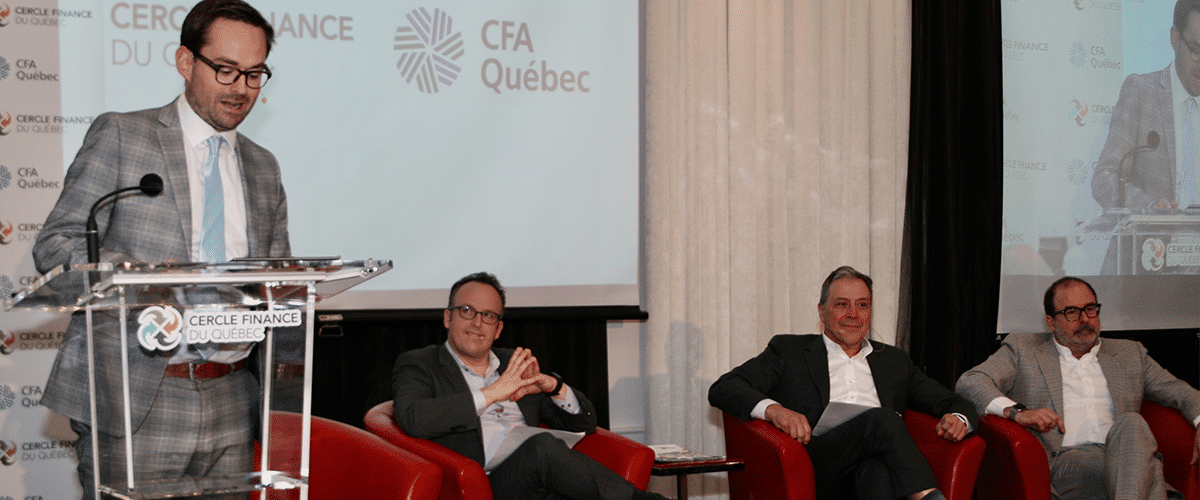Modernized distribution approaches are essential to take advantage of new opportunities in the savings and retirement market. Jean-François Chalifoux CEO of SSQ Insurance, Robert Dumas President and CEO of Sun Life Financial Quebec, and Stéphane Rochon, President and CEO of Humania Assurance, emphasized this message at the conference on retirement held November 5 at the Cercle finance du Québec, in Québec City.
Stéphane Rochon thinks the insurance industry is lagging behind in digital deployment of life insurance. Much awareness needs to be raised among distribution representatives. “Some still don’t even use a customer relationship management system (CRM),” he says.
Transaction costs in insurance and investment products remain very high. Rochon thinks the use of blockchain could lower them considerably. Digitalization already lets intermediaries handle more and more policies and serve a growing number of customers. The role of advisor will likely evolve as a result, he says
Developing algorithms
Robert Dumas says that developing algorithms in artificial intelligence can help insurers process disability insurance files more quickly, for mental health problems for example. He highlights the notable progress in data analysis to combat fraud, less on the customer side than among suppliers of insured services.
Jean-François Chalifoux adds that insurers and wealth managers have no choice but to change their customer approach because consumers are increasingly demanding and pressed for time. This context motivated SSQ Assurance to partner with the Dialogue virtual healthcare platform. “Our ethical challenge of the coming years is how to harness new technologies to create value for customers,” he says.
Regarding financial planning and investment, advances in artificial intelligence will revolutionize the industry in the coming years, Stéphane Rochon says, especially thanks to the predictive potential that the analysis of massive quantities of data allows.
Jean-François Chalifoux shared an anecdote about his 19-year-old son, who adamantly refused to call his caisse populaire to make an appointment with an advisor to invest the earnings he made from his summer job. In less than 48 hours he opened an account with WealthSimple. “Young people have expectations, and can’t be bothered with entry barriers. Business models must evolve,” he says.
Making insurance accessible
At Humania Assurance, the primary mission is to “make insurance accessible.”
“It seems simple, a three-word mission, but it’s actually very complicated,” Stéphane Rochon explains.
This accessibility shapes prices, the market, eligibility, product types, the purchasing process, the approach and the customer experience, and notably transparency in contract wording. “The contract must be easy enough for my 22-year-old daughter, an Occupational Therapy student at Université Laval, to understand, and she hasn’t got the slightest interest in it.”
In terms of eligibility, Humania was one of the first insurers in Canada to offer HIV-positive customers individual guarantees, starting in 2012. “Our ambition is not to capture our competitors’ market share but rather to make the whole pie bigger by targeting customers who are neglected by the other players,” Rochon explains.
To this end, Humania develops all the components of its technological platform and uses digital tools to reach its customers more effectively. Digitization of operations happened serendipitously in 2012, when the insurer wanted to offer guarantees to customers rejected by other insurers: those with a recent cancer diagnosis, professionals in risky lines of work, former drug addicts, people with a criminal record, etc. “There's a market there,” Rochon says.
To avoid underwriting errors, a digital solution was essential. Economies of scale spurred the rapid growth of this platform. “The first policy sold online was costly, but the second was a small fraction of that price, as were all those that followed,” Rochon explains.
Stéphane Rochon’s ideas are informed by conversations with people under age 30 and over age 60. The Hugo platform, launched in 2016, has reduced the policy issuance time from the industry average of 36 days to less than 45 minutes today. Also impressive: the algorithm can complete the underwriting in under 30 minutes in six out of ten cases.
Humania is seeking to innovate by launching products in underserved markets. One example is its 5575 platform, aimed at baby boomers, who represent 28% of the population. The platform also allows online underwriting of insurance products aimed at customers who had a previous cancer diagnosis.
Lifetime annuities regain popularity
The insurer offers investment products, including lifetime annuities. “It’s 100% certain that annuities will come back in fashion. We are at the end of the growth cycle on the markets,” Rochon says. This product can’t be sold online without help from an advisor, which is why each insurer must be able to differentiate its product offering if it wants to stay in business, he says.







